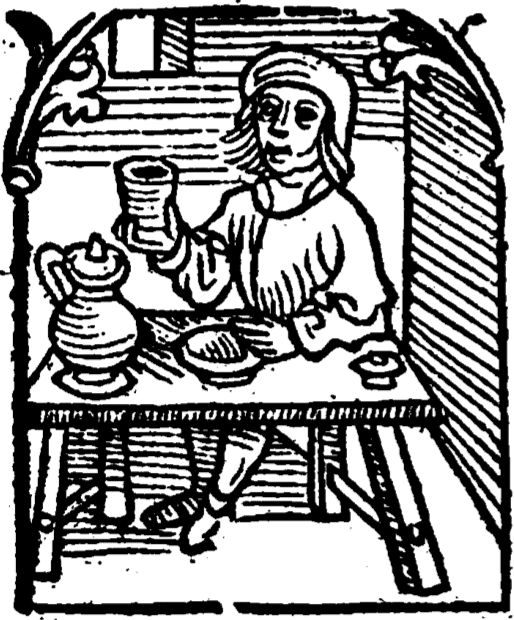The Art of Physick
Section B. Of the 6 Non-Naturals
2. Of Food and Drink
 Neue Artznei und Practicierbuchlin, Bock, 1551
Neue Artznei und Practicierbuchlin, Bock, 1551|
D. What sort of Meat is to be made choice of, for the preservation of Health? C. That which consists of good juice, easy of Digestion, and which contains the least Excrements. On the other side, Meat whose juice is evil, hard of concoction, and abounding with excrement, is to be avoided. D. What Meat is that which affords good Juice? C. That which is neither hotter nor colder, nor drier nor moister then it should be, but temperate; nether too glutinous, nor too thin; for such food breeds Blood of a laudable temperature and consistence, neither too thick, nor too serous. D. How much food is to be taken? C. So much as may suffice to restore the wasted substance of the Body; therefore they who abound with natural Heat, and use much exercise, because they make a great waste of their substance, need a larger supply of food. On the other side, they whose natural Heat is weak, and live at ease, ought to be moderate in eating; and the more plain and simple the Diet is, so much the more familiar to Nature. And as Sobriety is most wholesome, so plenty and variety of Victuals clogs and tires the Stomach. D. What method is to be observed in eating? C. Meat before it be swallowed, ought to be very well chewed by the Teeth. And there is this order to be observed in feeding, that the liquid must precede the solid, the light the heavy, and the loosening the binding Victuals. D. When is the best time to Feed? C. A man ought to feed at a set hour, the first being concocted and descended into his Belly; having before used sufficient exercise, and the Appetite calling for it, that Nature, which does her Work at a prefixed time, may the more Cheerfully attend the work of Concoction. D. What sort of Drink is best for the preservation of Health? C. Of all sorts of Drink, Wine is chiefly to be commended; but somewhat red, sometimes, clear, thin, not sweet, not sharp, fine, and rather small, then too strong; with a larger quantity of Water in the Summer, then in Winter: But to men of hot tempers, Water is more convenient then Wine; of which the best is the clearest and lightest, without the least ill scent or savor. Cider and Perry is better then Water, Ale and Beer well brewed of Barley-water and Hops, for those people that live in the North parts, is a good sort of Drink, so it be clear, thin, and neither too new, nor too small. D. How much Drink is sufficient? C. So much as is answerable to the Meat received. Solid and dry Diet requires more liberal drinking; for liquid and moist Meats, more moderate drinking will suffice. But as for Wine, if it be immoderately taken, it tears up the strength of Body and Mind, and hastens Old Age. D. What is the method of Drinking? C. Too much drink at Meals, causes the Meat to float in the Stomach; nor is it good to drink too sparingly, for that suffices not to quench thirst; and frequent drinking between meals, hinders Concoction; but all Drink whether Wine or Ale, made cooler either by Water, Snow, or Niter, to cool the Summer-heat, is to be avoided as pernicious to the Nerves. D. When is it proper to drink at Meals? C. As hunger argues a necessity of eating, so Thirst implies a necessity of drinking, to supply the Radical Moisture. But though a man be not dry when he has eaten the half of the solid meat he intends, it is yet then good to drink, to mix and moisten it in the Stomach, by which mans it may be the more easily digested, and conveyed to the Liver; for that Drink is the Vehicle of the Meat. But before Meat, and presently after Meals, after Bathing, or while a man is in a Sweat, all drinking is to be forborn. Previous: Of the Air Next: Of Sleeping and Waking |
Victuals: Foodstuff All Traditional Medicine systems emphasise the importance of chewing food well. Wine is warm and moist and benefits Digestion and Circulation; Small Wine means low alcohol and is usually wine diluted with water. Perry is fermented Pear juice Radical Moisture: Yin |
 The Art Of Physick
The Art Of PhysickSection A.
OF THE 7 NATURALS
(Physiology)
Introduction to the 7 Naturals
1. Elements
2. Temperaments
3. Parts
4. Humors
5. Spirits
6. Faculties
7. Actions
Section B.
OF THE 6 NOT-NATURALS
(Preservation of Health)
Introduction to the 6 Not-Naturals
1. Ambient Air
2. Food and Drink
3. Sleep and Waking
4a. Exercise &
4b. Rest
5. Excrements
6. Emotions (Passions of the Mind)
Section C.
OF THE 3 PRETER-NATURALS
(Pathology)
1. Diseases
2. Causes
3a. Symptoms &
3b. Signs
